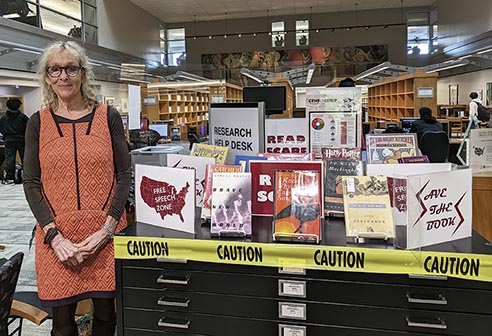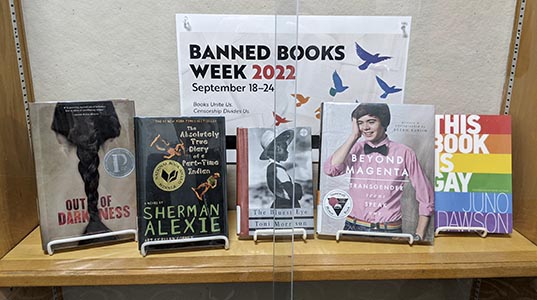By: Jacob Kuiper
Staff Writer

WCC librarian Maureen Perault stands next to a display of banned and challenged books for Banned Books Week. Jacob Kuiper | Washtenaw Voice.
2022 is on pace to smash last year’s record for number of library resources banned or challenged according to the American Library Association. (A “challenge” refers to an attempt to remove or restrict materials, based upon the objections of a person or group. A “ban” is the removal of said material.)
In 2021 there was a combined, year-long total of 729 attempts to restrict library materials across 1,597 unique titles. At the time this was a record in the 20 years ALA has been collecting this information. This record is set to be topped this year as 681 attempts have been made across 1,651 unique titles. This growing trend is compounded by a dramatic increase in multi-book challenges. More than 70% of this year’s challenges involved multiple titles, rather than the historic norm of specific, single target restriction attempts.
The ALA top 10 challenged books of 2021 are:
- “Gender Queer” by Maia Kobabe
- “Lawn Boy” by Jonathan Evison
- “All Boys Aren’t Blue” by George m. Johnson
- “Out of Darkness” by Ashley Hope Perez
- “The Hate U Give” by Angie Thomas
- “The Absolutely True Diary of a Part-Time Indian” by Sherman Alexie
- “Me and Earl and the Dying Girl” by Jesse Andrews
- “The Bluest Eye” by Toni Morrison
- “This Book is Gay” by Juno Dawson
- “Beyond Magenta” by Susan Kuklin
Despite this escalation, 20-plus year WCC veteran librarian Maureen Perault remains an advocate for controversial titles, “Librarians are fierce defenders of the freedom to read as a part of intellectual freedom. Banning books…is a violation of the First Amendment,” said Perault.
Not only does Perault see this as a freedom issue, she also sees it as a moral issue, “[When we censor this material] we lose our compassion for others. Books really do connect us. When we can’t read about people in different circumstances than we have, we lose cognisance of them. We lose our humanity,” said Perault.
This building of compassion is her main reason for defending controversial materials, particularly when it comes to the BIPOC and LGBTQ+ communities: “[These books] make us aware of things we would perhaps have never been made aware of. When we limit access to books that show [a] side of the story that we aren’t familiar with, it’s denying that these people actually exist,” said Perault.
Perault also advocates for remembering the humanity of librarians and library staff, “We are under attack…[for] just doing our job.”

Another display done by Maureen Perault for Banned Books Week of some of last year’s most banned and challenged books. Jacob Kuiper | Washtenaw Voice.
And she worries that this censorship will create less informed people, “I don’t know what it’s protecting [people] from….The more informed you are the more equipped you are to make decisions…[and this guides the] principles you want to follow and the values you want to respect.”
Despite her support for controversial material, no matter the content, Perault did note that not just any book makes it into Bailey Library, “We carefully analyze every single book that we buy to make sure that it’s well reviewed and of high quality information.” And she appears to have been rewarded for her careful advocacy; despite Bailey Library carrying many banned and challenged books you would have trouble finding any of them on the shelves, but for a very different reason than you might think: “I can’t put [them] on display because [they’re] on reserve for classes….students always check them out.”
Want to know more about how you can fight back against book bans and censorship? Visit ala.org or uniteagainstbookbans.org for more information and support.

